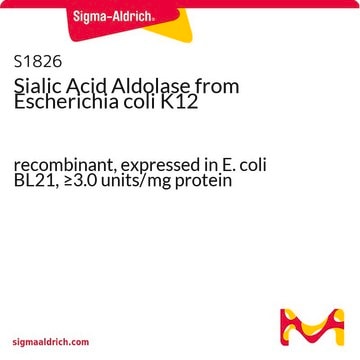A6680
N-Acetylneuraminic Acid Aldolase from microorganisms
lyophilized powder, ≥20 units/mg protein (biuret)
Synonym(s):
N-Acetylneuraminate Pyruvate Lyase, N-Acetylneuraminic Acid Lyase, NANA Aldolase, Sialic Aldolase
Sign Into View Organizational & Contract Pricing
All Photos(5)
About This Item
CAS Number:
Beilstein:
2697172
MDL number:
UNSPSC Code:
12352204
NACRES:
NA.32
Recommended Products
form
lyophilized powder
specific activity
≥20 units/mg protein (biuret)
mol wt
~98 kDa
storage temp.
−20°C
Looking for similar products? Visit Product Comparison Guide
Application
This enzyme is useful for enzymatic determination of N-acetylneuraminic acid and sialic acid when
coupled with the related enzymes in clinical analysis.
For industrial use, this enzyme is useful for enzymatic synthesis of sialic acid.
coupled with the related enzymes in clinical analysis.
For industrial use, this enzyme is useful for enzymatic synthesis of sialic acid.
Used in the Sialic Acid Quantification Kit, SIALIC-Q
Physical properties
Isoelectric point: 4.6 ± 0.1
Michaelis constant: 2.5 x 10‾3M (N-Acetylneuraminic acid)
Structure: 3 subunits (approx. 35,000) per mol of enzyme
Inhibitors: p-Chloromercuribenzoate, sodium dodecyl sulfact, Hg++, Ag+
Optimum pH: 7.5– 8.0
Optimum temp: 70°C
pH Stability: pH 6.0–9.0 (10°C, 25hr)
Thermal stability: Below 65°C (pH 7.5, 30 min)
Michaelis constant: 2.5 x 10‾3M (N-Acetylneuraminic acid)
Structure: 3 subunits (approx. 35,000) per mol of enzyme
Inhibitors: p-Chloromercuribenzoate, sodium dodecyl sulfact, Hg++, Ag+
Optimum pH: 7.5– 8.0
Optimum temp: 70°C
pH Stability: pH 6.0–9.0 (10°C, 25hr)
Thermal stability: Below 65°C (pH 7.5, 30 min)
Unit Definition
One unit will release 1.0 μmole of pyruvate from NANA per min at pH 7.7 at 37 °C.
Physical form
Lyophilized powder containing mannitol and EDTA
Storage Class Code
10 - Combustible liquids
WGK
WGK 3
Flash Point(F)
Not applicable
Flash Point(C)
Not applicable
Personal Protective Equipment
dust mask type N95 (US), Eyeshields, Gloves
Certificates of Analysis (COA)
Search for Certificates of Analysis (COA) by entering the products Lot/Batch Number. Lot and Batch Numbers can be found on a product’s label following the words ‘Lot’ or ‘Batch’.
Already Own This Product?
Find documentation for the products that you have recently purchased in the Document Library.
Customers Also Viewed
Sean R A Devenish et al.
Biochemical and biophysical research communications, 388(1), 107-111 (2009-08-04)
As part of a general study into the impact of quaternary structure on enzyme function, a library of 31 point mutations were engineered at the dimer-dimer interface of the homotetrameric (beta/alpha)(8)-barrel protein, N-acetylneuraminate lyase (NAL, EC 4.1.3.3). Disruption of the
Chung-Hsien Cheng et al.
Microbial cell factories, 9, 63-63 (2010-08-31)
Overexpression of recombinant proteins usually triggers the induction of heat shock proteins that regulate aggregation and solubility of the overexpressed protein. The two-dimensional gel electrophoresis (2-DE)-mass spectrometry approach was used to profile the proteome of Escherichia coli overexpressing N-acetyl-D-glucosamine 2-epimerase
Ivan Campeotto et al.
Journal of molecular biology, 404(1), 56-69 (2010-09-10)
The substrate specificity of Escherichia coli N-acetylneuraminic acid lyase was previously switched from the natural condensation of pyruvate with N-acetylmannosamine, yielding N-acetylneuraminic acid, to the aldol condensation generating N-alkylcarboxamide analogues of N-acetylneuraminic acid. This was achieved by a single mutation
Yinan Zhang et al.
Applied microbiology and biotechnology, 86(2), 481-489 (2009-11-06)
N-acetyl-D-neuraminic acid (Neu5Ac) is a precursor for producing many pharmaceutical drugs such as zanamivir which have been used in clinical trials to treat and prevent the infection with influenza virus, such as the avian influenza virus H5N1 and the current
Jacqueline Vogel-Scheel et al.
Applied and environmental microbiology, 76(15), 5181-5187 (2010-06-22)
To study the adaptation of an intestinal bacterium to its natural environment, germfree mice were associated with commensal Escherichia coli MG1655. Two-dimensional gel electrophoresis was used to identify proteins differentially expressed in E. coli MG1655 collected from either cecal contents
Our team of scientists has experience in all areas of research including Life Science, Material Science, Chemical Synthesis, Chromatography, Analytical and many others.
Contact Technical Service









